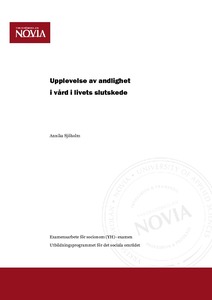Upplevelse av andlighet i vård i livets slutskede
Sjöholm, Annika (2013)
Sjöholm, Annika
Yrkeshögskolan Novia
2013
All rights reserved
Julkaisun pysyvä osoite on
https://urn.fi/URN:NBN:fi:amk-2013120319821
https://urn.fi/URN:NBN:fi:amk-2013120319821
Tiivistelmä
I Novias projekt Andlighet, spiritualitet och livsfrågor- You name it- är syftet att på sikt utveckla olika metoder och modeller tillsammans med Novia Dei som är samarbetspartner. Beroende på vilken examen de studerande får bestäms kontexten.
Då projektet är i sin första Fas 1 så har det som ett första led varit att ta reda på vad andlighet är. Vilka existentiella behov och livsfrågor man kan möta i sin blivande profession som socionom.
Syftet med det här arbetet har varit att få en djupare inblick i hur personal som arbetar med vård i livets slutskede uppfattar andlighet. Min metod jag använt mig av är en kvalitativ litteraturstudie. Jag har på ett hermeneutisk vis velat få djupare förståelse om andlighet och hur det kan upplevas i vård i livets slutskede.
Personal upplever att andligheten kan upplevas i form av närhet, omsorg och kunskap och det är den stora helheten i arbetet med vård i livets slutskede. Genom ett gott ledarskap, mer tid för reflektion och utbildning i andlighet så upplever personal att begreppet andlighet behöver få mer plats i vården i livets slutskede. The goal of Novia’s project Spirituality and Existentiality- You Name It is ultimately to develop different methods and models in cooperation with the project Novia Dei. The context of model and method development is determined by the degree programs the individual students aspire to and succeed at. Phase 1 of the project has been to determine the nature of spirituality and what it entails, and the potential needs, requirements, and applications of spirituality in the students’ future professions as social workers.
The goal of this thesis has been to reach a deeper understanding of how caregivers in end-of-life care situations experience and/or utilize spirituality in their work. The method used for this thesis has been a qualitative study of literature. I have, with a hermeneutic perspective, aspired to reach a deeper understanding of spirituality and its applications in end-of-life care situations.
Caregivers can experience spirituality differently- as relational, formal care giving, or practical knowledge, and that different aspects of these can form a totality of application in end-of-life care. Staff can experience that spirituality requires more consideration in end-of-life care situations, and that through an understanding leadership corps, more time for reflection and education, this requirement can be fulfilled.
Då projektet är i sin första Fas 1 så har det som ett första led varit att ta reda på vad andlighet är. Vilka existentiella behov och livsfrågor man kan möta i sin blivande profession som socionom.
Syftet med det här arbetet har varit att få en djupare inblick i hur personal som arbetar med vård i livets slutskede uppfattar andlighet. Min metod jag använt mig av är en kvalitativ litteraturstudie. Jag har på ett hermeneutisk vis velat få djupare förståelse om andlighet och hur det kan upplevas i vård i livets slutskede.
Personal upplever att andligheten kan upplevas i form av närhet, omsorg och kunskap och det är den stora helheten i arbetet med vård i livets slutskede. Genom ett gott ledarskap, mer tid för reflektion och utbildning i andlighet så upplever personal att begreppet andlighet behöver få mer plats i vården i livets slutskede.
The goal of this thesis has been to reach a deeper understanding of how caregivers in end-of-life care situations experience and/or utilize spirituality in their work. The method used for this thesis has been a qualitative study of literature. I have, with a hermeneutic perspective, aspired to reach a deeper understanding of spirituality and its applications in end-of-life care situations.
Caregivers can experience spirituality differently- as relational, formal care giving, or practical knowledge, and that different aspects of these can form a totality of application in end-of-life care. Staff can experience that spirituality requires more consideration in end-of-life care situations, and that through an understanding leadership corps, more time for reflection and education, this requirement can be fulfilled.
